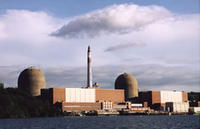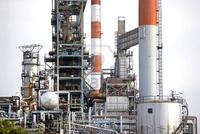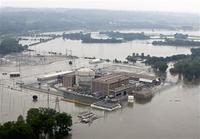-
Quake-resistant superelastic alloy developed
Japanese scientists added a small amount of nickel to an iron-based alloy, and found that the new material can recover its original shape at any temperature from -196 to 240 degrees Celsius; the material may be used in environments that are constantly exposed to extreme temperatures, such as joints and controls in cars, planes, and spacecraft; it may also help buildings cushion stress and violent movement in earthquakes
-
-
New York governor determined to close Indian Point nuclear plant

The Indian Point nuclear power plant, located thirty-five miles north of New York City, is facing increasing pressure from Governor Andrew Cuomo and senior officials say the governor is determined to shut it down; the governor’s hand has been strengthened by new legislation that streamlines the approval process for siting new power plants in New York, a move that would make it easier to replace Indian Point; closing the nuclear plant would be a major step toward reshaping the state’s energy policy as the plant produces 2,000 megawatts and provides New York City and Westchester with 25 percent of their power — but the nuclear disaster in Japan caused by the 11 March earthquake and tsunami raised fresh concerns about the plant, which is located near a fault line
-
-
Power grid experiment could throw clocks off
Beginning in July, electronic clocks in the United States could begin running as much as twenty minutes ahead; the Federal Energy Regulatory Commission (FERC), the agency in charge of the U.S. electrical grid is considering an experiment that would alter the frequency of the energy current in an effort to make the power supply more reliable and save money
-
-
Senate committee passes chemical security bill

This week, the Senate Committee on Homeland Security and Governmental Affairs voted 8-2 for Senator Susan Collins’s bill (S. 473) to renew the Chemical Facility Anti-Terrorism Standards (CFATS), which is designed to regulate the chemical industry to ensure that they are keeping their facilities safe from terrorist attack; a similar bill has already been approved by a House committee; so far DHS has reviewed 39,000 chemical facilities in the United States and has determined that more than 4,755 are high risk and need to develop detailed security plans
-
-
Sharp divisions over chemical plant security measure
Those who opposed the original Chemical Facility Anti-Terrorism Standards (CFATS) continue to oppose it — and for the very same reasons: they argue it does not go far enough to assure the security of chemical plants in the United States; they point out the versions of the bill approved by House and Senate committees prevent DHS from requiring specific security measures; fail to require safer and more secure chemical processes; exempts thousands of potentially high risk chemical and port facilities, including approximately 2,400 water treatment facilities and 400-600 port facilities, including 125 of 150 U.S. refineries; and prevents plant employees from participating in assessing vulnerabilities and developing security plans
-
-
Los Alamos nuclear waste safe from wildfire
A wildfire is raging near the Los Alamos national Lab; the fire, in some places, is only yards away from the lab’s outside perimeter — and it is eight miles from the so-called Area G; the Area G site is a 63-acre storage facility where thousands of drums of nuclear waste sit, many of which are outdoors started; the good news is that there is no danger that the fire will reach Area G because in 2000, an even more intense fire burned 90 percent of the forest that covered the area between the current fire and the nuclear waste disposal site, making it impossible for the current wild fire to reach the nuclear material on storage
-
-
Germany approves plan to shutdown nuke plants

On Thursday Germany’s parliament overwhelmingly voted in favor of approving the country’s plans to end its nuclear program by 2022; Germany’s eight oldest reactors, which were closed shortly after the 11 March earthquake and tsunami in Japan, will remain off while the country’s nine other nuclear plants will be shut down in stages
-
-
Flights increase rain and snow near airports
Areas near commercial airports experience a measurable increase in rain and snow when aircraft take off and land under certain atmospheric conditions; when planes fly through certain mid-level clouds, they force nearby air rapidly to expand and cool; this causes water droplets to freeze to ice and then turn to snow as they fall toward the ground, often leaving behind odd-shaped gaps in the clouds
-
-
"Sensing skin" to monitor concrete infrastructure health inexpensively
In 2009, the American Society of Civil Engineers (ASCE) assigned the grade D to the overall quality of infrastructure in the United States and said that ongoing evaluation and maintenance of structures was one of five key areas necessary for improving that grade; civil engineers recently proposed a new method for the electronic, continual monitoring of structures
-
-
Nebraska floods test a nuclear power plants new safety measures

U.S. nuclear officials are closely monitoring two atomic energy plants in Nebraska that are in danger of being inundated with water as the Missouri River continues to creep ever closer; the Fort Calhoun nuclear plant has been closed for refueling since April and will remain off until the flooding subsides, but officials are worried about keeping the recently removed fuel rods cool as the facility’s parking lot has been flooded
-
-
Active cyber-defense strategy best deterrent against cyber-attacks
With the threats of cybercrime, cyberterrorism, and cyberwarfare looming over a hyper-connected world, the best defense for the United States might be a good offense; experts argue that an active self-defense regime, which they term “mitigative counterstriking” — is a necessity in cyberspace, especially to protect critical infrastructure such as banking, utilities, and emergency services
-
-
RAILENIUM awarded 550 million Euro boost from French government
RAILENIUM, the European Institute for Technological Research in Rail Infrastructure, has been selected by the French government as a leading investment project and has been awarded 550 million Euros in funding; the equipment and research platforms that RAILENIUM will provide will be unique in Europe; this will include a 5 km rail test loop, a tramway test track, a fatigue-simulation track, running trial facilities, and service structures
-
-
Sector Report for Monday, 27 June 2011: Infrastructure protection
This report contains the following stories.
Plus 1 additional story.
-
-
New building material could help solve bridge woes
With infrastructure in the United States rapidly aging and in need of repair, new building materials made in Maine that make bridges cheaper, lighter, and more durable could help cash starved states undertake critical infrastructure investment; using lightweight hybrid composite beams, the Maine Department of Transportation (MDOT) has just completed the largest composite bridge in the world; the new bridge is projected to last at least 100 years; the material’s weight, cost, and durability have generated a lot of interest across the country
-
-
China secures nukes ahead of major storms
Nuclear power plants along China’s coast are hardening their facilities in advance of the major typhoon storm systems that are expected to hit the country this year; the storms will create massive waves that could cause casualties and property damage; experts expect the Jiangsu and Fujian provinces to be hit the hardest in the east and the Guangdong and Hainan provinces in the south
-
More headlines
The long view
Falling Space Debris: How High Is the Risk I'll Get Hit?
By Zulfikar Abbany, Julia Vergin, and Katja Sterzik
An International Space Station battery fell back to Earth and, luckily, splashed down harmlessly in the Atlantic. Should we have worried? Space debris reenters our atmosphere every week.
Using Drone Swarms to Fight Forest Fires
Forest fires are becoming increasingly catastrophic across the world, accelerated by climate change. Researchers are using multiple swarms of drones to tackle natural disasters like forest fires.
Strengthening the Grid’s ‘Backbone’ with Hydropower
By Michael Matz
Argonne-led studies investigate how hydropower could help add more clean energy to the grid, how it generates value as grids add more renewable energy, and how liner technology can improve hydropower efficiency.
LNG Exports Have Had No Impact on Domestic Energy Costs: Analysis
U.S. liquified natural gas (LNG) exports have not had any sustained and significant direct impact on U.S. natural gas prices and have, in fact, spurred production and productivity gains, which contribute to downward pressure on domestic prices.
